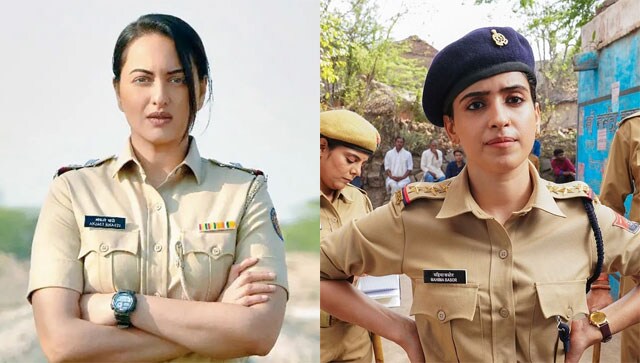In a scene from Amazon PrimeVideo’s Dahaad, Bhaati (Sonakshi Sinha) the lower-caste woman officer leading an investigation into the serial murders of women in Mandawa (Rajasthan) is stopped by a suspect’s upper-caste father from entering his house. A typically stubborn Bhaati walks in nonetheless. “Ye tumhare purvajo ka nahi, samvidhaan ka samay hai,” she declares. It’s a wildly affecting sequence, enhanced by the fact that the woman gets to have her say without the men around her, assisting or doubling down. A frame shows her confront the risible father figure, the metaphorical baggage of history if you like, while her two seniors watch on either side, flanking her silently yet supportively. In Netflix’s Kathal, a woman police officer (again) asks a casteist man to read the name on her badge. There are eerie similarities to both stories, as both seek to crush through the agency of their women, the oppressive reality forged by men.
In both Dahaad and Kathal, lower-caste women take centre stage. Both investigate the disappearances of women, a surreal parallel across stories that follow wildly different templates. While Dahaad is a sobering procedural that gets into the mind of a caustic man, Kathal evokes the absurdity of our socio-political priorities. We believe in exacting ideas like caste and class, while actual humans evade our consciousness with gut-wrenching regularity. This lack of urgency in solving our most immediate problems is echoed by the peculiarity of Kathal’s premise, and the seamlessness of Dahaad’s narrative. Both are disinterested in twists and thrills. They simply want you to listen and look further than you have before.
Sinha’s portrayal of Bhaati in Dahaad feels one-toned at times but it also adds a tinge of resentment to the character. What else would a woman, embittered by forceful nature of the world around her be if not perpetually displeased? Mahima (Sanya Malhotra), as the lower-caste officer leading an investigation into missing Jackfruits, is perfectly in-tune with the surrealism of the plot but she lacks the feisty quality of her compatriot Bhaati. The latter has love in her life, but isn’t pre-occupied by it. The former courts love, and to detriment of the film’s impact, deals with inter-caste issues there as well. Kathal, after a point, overplays its hand at the messaging.
Related Articles
Both Dahaad and Kathal are based out of the hinterland, fictional and real. They illustrate fault-lines so casually drawn across the Indian landscape it takes stubborn, pushy women to highlight them by, at times, carelessly walking past them. The men, at least in both stories, know this geometry by heart. They are the ones who’ve created it after all. It makes sense then that these boundaries must be set alight by the fire of women resisting the urge to settle or conform. They aren’t perfect heroes, not by any stretch of the imagination, but maybe they aren’t trying exceptionally hard to become one either. It’s this nuanced approach that draws audiences away from imagining heroes and, instead search for people inside these characters.
Beyond the similarities, there are also contrasting portrayals of our stuttering justice system. In Dahaad, prejudice might be rampant but the system itself, manages to drag along at a committed pace. It even showcases woke men, comfortably placed ahead of the curve in terms of progressive thinking. In Kathal, on the other hand, police officers seem inept, comically ill-equipped to handle the complexity of the world they are attempting to both understand and solve. It’s where the women become shining lights, ushering in both compassion and caution. Mahima confronts a junior officer about the ease with which he resorts to violence. Bhaati doesn’t just catch a killer but also correct her mother’s obsession with marital projections. Sometimes bigger battles have to be fought at home. The women know this better than the men.
Both Dahaad and Kathal aren’t perfect stories, nor do they echo similarities beyond a handful of world-building facts. But they are, in an eerie coming together of providential coincidence, about two self-confident women standing their ground. Neither is an ecstatic celebration of bravado nor does either story fetishize the challenges these women navigate on a mental and a physical level.
The hidden economy of gender dictates that women ought to know their place and yet both Mahima and Bhaati are, happily, rewardingly, immune to it. Bhaati addresses her peers directly while Mahima can’t help but counter ludicrous suggestions with some biting wit of her own. Casual sexism, bigotry etc are ever-present but here the women prevent them from defining their visions of the future. Because the future, is probably a place without these aged, crumbling ideas. At least we’d like to hope so.
Read all the Latest News, Trending News, Cricket News, Bollywood News, India News and Entertainment News here. Follow us on Facebook, Twitter and Instagram.


